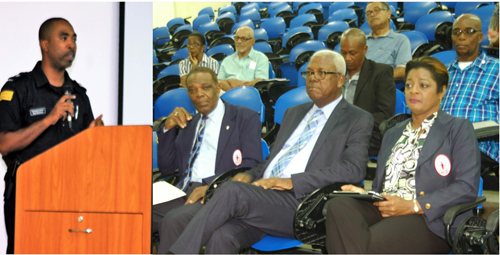
Clinton Pickering
Freelance Writer
Up to mid-November, 10 firearms, manufactured overseas and locally, 62 rounds of ammunition and 75 offensive weapons, were seized in the Mount Salem Zone of Special Operations (ZOSO). Other items seized included lotto scamming paraphernalia.
Also, since January to November, the wider Mount Salem police area of some 15 communities, including the ZOSO, recorded some 84 murders and shootings. Of that number, 43 were murders, of which the police believe 26, or over 50 percent, “to be driven by gangs and gang activities.”
The figures were disclosed by Superintendent Kirk Ricketts in a presentation to the Lay Magistrates’ Association – St. James Chapter, at the Montego Bay Community College on Thursday, November 16, 2017.
Supt. Ricketts, who is Ground Commander for ZOSO, went on to give an update on operations in the Zone, noting that: “we have not had any shootings in the area since we have been there; we have not had one shot being fired.” The only incident involved two youngsters stabbing each other. “We have kept the zone free of violence since we have been there,” he reported.
But he underscored that other issues that make the community conducive to crime and violence still existed. “Every day I’m in the community and see high levels of unemployment and I find the community quite unique in the sense that it mistrusts the justice system and tends to want to deal with their own issues.” It therefore had a high level of unresolved domestic issues that result in stabbings or gun play.
In addition to the “mind boggling” number of unemployed youths, the community also has a high rate of school dropouts by youngsters in their mid-teens who turn to gang activity.
However, when contacted on Thursday, Superintendent Lindsay denied that the police and soldiers had left, but had only changed their mode of operations, based on the fact that the ZOSO was now moving into the social intervention segment of the programme.
“The police and the soldiers have not left; what has happened is that they have shifted into a different modality of operations but are still operating as a zone – if it becomes necessary then they will lock it down again to impose a curfew if necessary. Sometimes what they do is remove some of the check points and go for more patrolling – so they remove some of the restrictions and do adjustments from time to time,” Superintendent Lindsay explained.
Meanwhile, a closed-door meeting of the 24-member ZOSO Social Intervention Committee will be held this morning at 11 o’clock in Mt. Salem.
SOCIAL INTERVENTION
Omar Sweeney, Chief Executive Officer of the Jamaica Social Investment Fund (JSIF) the agency charged with implementing the social intervention aspect of ZOSO, said the meeting will seek to finalize the timeline and the scope of these medium-term intervention strategies or those to be implemented over the next three to six months.
“We have taken an approach where community leadership is at the front of the process and so we have opened a communication channel there. So this is a process which I hope will be completed by the end of this month, which will be the first 30 days of the extension. After this, we should be in a position to begin the implementation,” Sweeney explained.
He said in interim, JSIF would continue its registration of young people in the community to have them enrolled in training programmes, and would, in conjunction with the National Work Agency, effect drain-cleaning programmes.
Mr. Sweeney said other infrastructure works are needed, as well as retaining walls to be constructed. “We have close to sixty persons on short term employment as we engage in the initial intervention aspect of the programme,” he disclosed.
Quizzed as to whether there was a budget for the infrastructure aspect of the ZOSO, Mr. Sweeney explained that each agency, including the Heart Trust and JSIF, would come to the programme with an established budget and would therefore tailor their budget by way of priority to suit the needs of the community and its residents.


